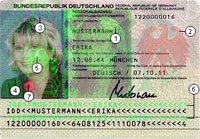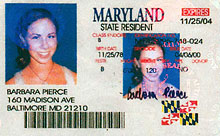What's Wrong With Showing ID?
- Bertold Brecht
What does an ID, any ID, do for security? The honest answer is 'not much'. If anything, relying on ID for security purposes actually makes things worse.

Showing ID only affects honest people. If you're dishonest, you can obtain false documents or steal the identity of an honest person.
If a 19 year-old college student can get a fake ID to drink, why couldn't a bad person get one, too? And no matter how sophisticated the security embedded into the ID, wouldn't a well-financed terrorist be able to falsify that, too? The answer to both questions is obviously 'yes'.
Honest people, on the other hand, go to Pro-Life rallies. Honest people attend gun shows. Honest people protest the President of the United States. Honest people fly to political conventions. What if those with the power to put people on a 'no fly' list decided that they didn't like the reason for which you wanted to travel? The honest people wouldn't be going anywhere.
Bad people, besides using fake IDs and stolen identities, can also make the system of checking IDs work in their favor. The Carnival Booth effect, as described by researchers at the Massachusetts Institute of Technology, means that terrorists can probe an ID security system by sending a number of people on innocent trips through the system and noting who is flagged for extra searches and who isn't. They then send only those who the system doesn't flag on terrorist missions.

Still, some Americans think that 'if you have nothing to hide, you have nothing to fear'. Were the Founding Fathers criminals trying to protect themselves when they inserted the 4th and 5th amendments into the Bill of Rights? After all, nobody who hasn't done anything wrong needs to worry about being searched or being forced to testify against himself.
Over the years, Americans have become accustomed to showing ID in any number of circumstances. Few have asked the question, 'Why?'.
The custom of showing ID at airports came about in July of 1996, in the wake of the TWA flight 800 disaster. Faulty fuel tank insulation caused TWA 800 to explode over Long Island Sound. Before we knew that, there was concern that terrorists had blown up the plane. According to former terrorism czar Richard Clarke's book, the ID requirement was instituted as a temporary measure so that then-President Clinton had something to announce to the families of the victims when he met with them. After the 2001 World Trade Center bombings, the ID requirement became mandatory, as anyone who has flown since can testify.
The Department of Homeland Security has attempted to institute programs predicated on the use of ID to improve air security. One such program, the Computer Assisted Passenger Profiling System II (CAPPS II) would have required every citizen to undergo a background check as a precondition to travel by commercial airline.

CAPPS II depended on the presentation of government-issued photo ID in order to function. The information contained on the ID would have been cross-checked against a variety of public and private databases, and an individual threat assessment would be generated based on this information. The CAPPS II program was pronounced 'dead' in July of 2004, but the Department of Homeland Security is continuing to work under wraps to produce a replacement system that works similarly.
Another program which depends on showing ID is the Watch List and No-Fly List. Airlines are issued these lists by the federal government and are required to request ID from their passengers in order to check them against the lists. This has resulted in countless citizens with names similar to bad people being harrassed, arrested, or prevented from travelling by air—including every person named 'David Nelson'.
Much has been done to make travel by air safer. Cockpit doors have been secured, pilots are armed, and Air Marshals patrol airplane cabins. Increased physical security at airports has dramatically increased the safety of our nation's skies. Above all, the mindset of the flying public has also changed: no longer will passengers remain passive in the event of a skyjacking.
The demand for ID does nothing for security while making honest Americans less free.
How can such systems be dangerous? Learn more...